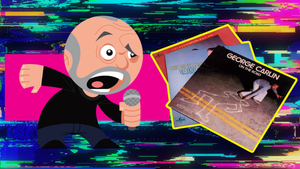The daughter of late comedian George Carlin has said that his estate's now settled legal battle over an AI-generated fake comedy special, which was put online in January, should serve "as a warning about the dangers posed by AI technologies and the need for appropriate safeguards not just for artists and creatives, but every human on earth".
Kelly Carlin issued her statement as lawyers confirmed with the courts in California that a settlement had been reached with the producers of the Dudesy podcast, which created and published the AI-generated comedy routine. The concerns expressed by the Carlin estate over the use of AI to imitate his voice echoed concerns raised by many in the music community.
The settlement, the estate's lawyer Joshua Schiller told reporters, constitutes “a blueprint for resolving similar disputes going forward where an artist or public figure has their rights infringed by AI technology. Our goal was to resolve this case expeditiously and have the offending videos removed from the internet so that we could preserve Mr Carlin’s legacy and shine a light on the reputational and intellectual property threat caused by this emerging technology”.
At the beginning of the fake comedy special, which was called 'George Carlin: I'm Glad I'm Dead', a voiceover announced that it was an "AI engine" which had listened to 50 years of material from Carlin and then sought to "imitate his voice, cadence and attitude as well as the subject matter I think would have interested him today”.
That statement basically admitted that the team behind Dudesy had trained their AI tool with Carlin's content without permission, which - the estate would argue - constituted copyright infringement. Though the AI-generated comedy act also exploited Carlin's voice and, the estate argued, potentially damaged his reputation.
When the estate went legal in late January, it stated, "In addition to the immediate fact of infringement, defendants' AI-generated 'George Carlin Special' may also deter younger audiences, who are unfamiliar with George Carlin, from engaging with his real work that is his legacy. Defendants must be held accountable for adding new, fake content to the canon of work associated with Carlin without his permission (or that of his estate)".
Many of the AI companies that have been accused of copyright infringement for using existing works as training material without licence have argued that they don't need a licence, because using copyright protected content in that way is 'fair use' under US law.
However, the team behind Dudesy didn’t issue any ‘fair use’ statements. Instead, once the estate’s lawsuit was filed, they quickly removed the fake comedy special and all mentions of it on social media, which presumably made negotiating a settlement easier.
Which is something Kelly Carlin also noted in her statement, adding, "I am pleased that this matter was resolved quickly and amicably, and I am grateful that the defendants acted responsibly by swiftly removing the video they made".
However, with legal uncertainties remaining about the copyright obligations of AI companies and the exact role of publicity rights in helping people protect use of their voice or likeness by AI, this could have ended up as a long drawn out legal battle.
There are proposals in US Congress to pass a new publicity right that would provide clear protections for performers - and people more generally - when it comes to stopping the exploitation of their voice or likeness by generative AI. Presumably Kelly Carlin and her late father's estate can be counted as supporters of those proposals.

